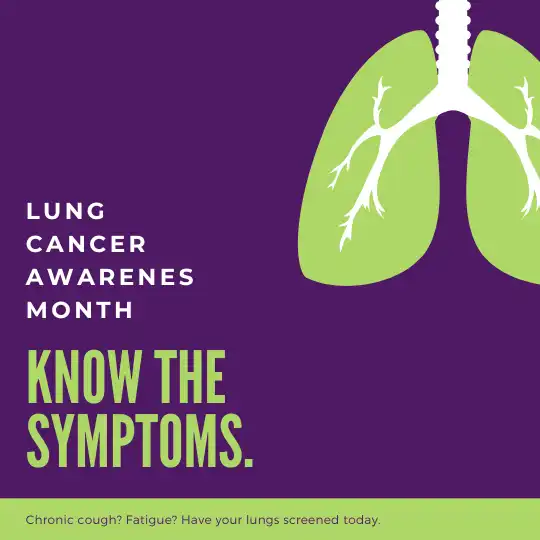Written and medically reviewed by Dorcas Morak, Pharm.D
Every year in November, Lung Cancer Awareness Month is commemorated. It emphasizes the need for more research is essential while fostering greater knowledge of the condition. It is important to raise awareness of lung cancer due to the asymptomatic nature of the disease until it has progressed significantly. Read on to know more about lung cancer and how you can participate in raising awareness.
What are the Goals of Lung Cancer Awareness?
The goals of lung cancer awareness are:
- Promote early detection of lung cancer.
- Enlighten the public about the risk factors.
- Enlighten the public about prevention.
- Raise funds to support research on lung cancer.
What are the Facts about Lung Cancer?
Do you know that:
- The average person breaths 22,000 times per day.
- Exercise increases lung capacity.
- Lung cancer is the second most common cancer.
- Lung cancer is the leading cause of cancer death in the United States.
- There are about 236,740 new cases of lung cancer and about 130,180 deaths yearly in the United States.
- Coughing and sneezing clears your lung of foreign matter.
- Lung cancer is mostly asymptomatic until the cancer advances.
What are the Types of Lung Cancer?
There are two main types of lung cancer: small-cell lung cancer and non-small-cell lung cancer. The difference is how they look under the microscope.
What are the Symptoms of Lung Cancer?
Lung cancer is mostly asymptomatic until the cancer advances. Some of the symptoms and signs you may later observe are:
- Persistent cough
- Coughing up blood
- Shortness of breath
- Chest pain and chest tightness
- Weight loss
- Hoarseness
- Headache
What are the Risk Factors for Lung Cancer?
There are many potential risk factors for lung cancer. Some of them like smoking are controllable while others like family history are not. Examples are:
- Smoking.
- Exposure to secondhand smoke.
- History of radiation therapy.
- Exposure to radon gas.
- Exposure to asbestos and other carcinogens at work.
- Family history of lung cancer.
How can I lower my Risk for Lung Cancer?
You can lower your risk for Lung cancer by avoiding its risk factors.
What are the Treatment Options for Lung Cancer?
Several treatment options are available for lung cancer, depending on the type and the severity at the time you begin the treatment.
- Radiation therapy
- Chemotherapy using Cisplatin, Carboplatin, Docetaxel (Taxotere), Etoposide (Toposar)
- Surgery
- Targeted therapy using Ceritinib (Zykadia), Alectinib (Alecensa), Lorlatinib (Lorbrena)
How to Prevent Lung Cancer?
There's no clear-cut way to prevent lung cancer but you can reduce your risk by:
- Quitting smoking.
- Avoiding exposure to secondhand smoke.
- Keeping the radon label at your home low.
- Avoiding exposure to carcinogens at work.
- Eating fruits and vegetables for vitamins.
- Exercising regularly.
What are the Complications of Lung cancer?
Possible complications of lung cancer are:
- Shortness of breath.
- Coughing up blood.
- Excruciating pain.
- Cancer of other body parts through metastasis.
How to Get Involved in Lung Cancer Awareness?
You can join in creating awareness against lung cancer by:
- Attending a lung cancer conference
- Educating the public about the causes of lung cancer and the importance of its early detection through social media using hashtag #LungCancerAwarenessMonth
- Donating money to support lung cancer research
- Getting your home tested for radon
- Getting screened for lung cancer if you are eligible
The high cost of drugs for the treatment of lung cancer can be a barrier for people to seek treatment. You can support people around you with lung cancer by showing them how to use an a free RxLess discount coupon to get up to an 88% discount on their medications. The coupon can be used in many pharmacies across the USA including CVS Pharmacy, Rite Aid, and Walgreens.

















